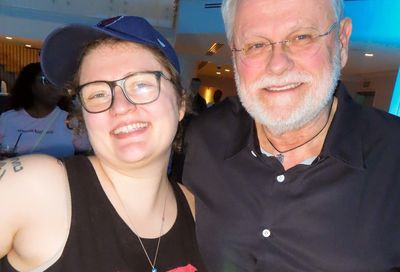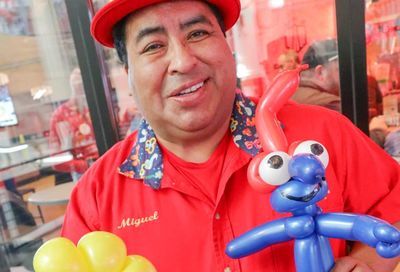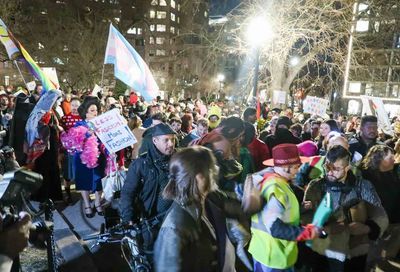Fighting Back
Commentary: Alphabet Soup
It’s possible, perhaps even likely, that when he walked into the room, Wayne was as surprised to see me as I was upon seeing him. I suspect I had fallen as cleanly off his radar as he had mine; it wasn’t that I’d forgotten about him, exactly, but our paths hadn’t crossed in so long.
It was jarring to see him, really, in the way that a single person can evoke a flood of memories of a particular time that has been so neatly filed away. For me, Wayne Turner symbolizes an era of activism that coincided with my career in gay journalism, back in the day when people protested and got arrested trying to raise awareness and effect change in the government’s response to the AIDS epidemic. Turner was one of the founders of the second wave of ACT UP in D.C.; he and his partner, Steve Michael, re-energized a movement that had, in this city, faded out a couple of years earlier.
I didn’t cover AIDS as a beat, although I sat through my share of ACT UP meetings and certainly wrote plenty of stories about the movement and the politics around the disease, including play-by-play coverage of congressional action on various pieces of legislation. My areas of focus were lesbian health and Maryland politics, with a stint covering Congress — I was never expected to know much about the medical side of AIDS.
Yet these activists became a big part of my work at the time, both while I was a reporter and later as an assignment editor and then managing editor of the Washington Blade. For most of the time I worked there, activism was a huge presence in the community and on our pages — I’m sure the activists would say they weren’t covered by us enough, but part of the joy of journalism is that you can’t possibly please all of the people all of the time.
So seeing Turner brought this flood of memories back, on both a personal and professional scale. I came to D.C. from Iowa — while I’m sure I encountered some people with AIDS while in Iowa, I didn’t have to look the epidemic in the eye the way I did when I came to the nation’s capital and started work at what was then the nation’s premier gay newspaper.
When I interviewed for the job, the woman who would become my boss asked me challenging questions, including whether I’d have any problem coming directly from lily-white Iowa into a majority-black city. She told me point-blank — and she was right — that I would often find myself the minority when covering meetings and events, and that sometimes I would be the only white person in the room. I had no qualms about that and it didn’t unsettle me to think about it; I knew it was an overdue experience.
What did unsettle me during that interview was when she asked me to pretend she had just landed on this planet and had no idea what AIDS was; she wanted me to explain it to her. I hemmed and hawed — I was intimidated to think about revealing my minuscule level of knowledge on the subject to someone who had been covering the epidemic since it surfaced in Washington. I ended up stumbling through, and clearly I didn’t blow it, since she hired me. I believe her assessment during the interview was “not bad, for a girl” — and I knew what she meant by that.
Today, AIDS is pretty widely regarded as a chronic, manageable condition, like diabetes or high blood pressure. It could — and does — kill people, but that outcome has become much less prevalent in this country than it once was. Generally speaking, people with AIDS die of other things now.
Because of that, and because my career has shifted so that I rarely deal with AIDS reporting, the activists of that time did slip silently off my radar. I’m not proud of that, but it’s like a lot of other things from that time, my 20s — things that were monumental at the time, and now are archived memories in the recesses of my brain.
So seeing Turner was a welcome surprise. The occasion that brought us together was a brunch featuring some gay authors, including Frank Muzzy, the man who researched and authored Gay & Lesbian D.C., a photo book reflecting the city’s gay history. Standing before his audience, Muzzy talked about the photos he had collected, and a question from Turner led Muzzy to talk about the photo he was most moved by: the open-casket political funeral, in front of the White House, of activist Steve Michael, Turner’s partner.
Muzzy didn’t know Wayne Turner before that moment, when Turner quietly said, “That was my partner.” The room was silent, out of respect, out of awe, out of remembrance, out of awkwardness. I remembered that funeral from my point of view at the time — I had to make the call on whether we used a picture of the casket open or closed, and I went with closed because the photo was every bit as dramatic and it felt less sensationalized. I was also sad, as I’d gotten to know Steve a little bit, and while he could sometimes be a thorn in the side of the local media, he was a genuinely nice man who worked incredibly hard. He never made the tension between AIDS activism and gay journalism a personal matter, the way some others did (one particular fellow was fond of spewing invectives at me when I would answer my phone).
Catching up with Turner took me back, but it also took me forward — it reminded me of how far we’ve come in the face of the massive injustice of the AIDS epidemic here. As an international problem, it remains deplorable and in a state of crisis, but here it feels like the movement did happen, and that the activism of the 1990s did trigger progress. Like all that shouting and sign-waving and civil disobedience made people pay attention. Like the funeral procession down Pennsylvania Avenue in 1998 was not in vain.
Kristina Campbell can be reached at kcampbell@metroweekly.com.
Support Metro Weekly’s Journalism
These are challenging times for news organizations. And yet it’s crucial we stay active and provide vital resources and information to both our local readers and the world. So won’t you please take a moment and consider supporting Metro Weekly with a membership? For as little as $5 a month, you can help ensure Metro Weekly magazine and MetroWeekly.com remain free, viable resources as we provide the best, most diverse, culturally-resonant LGBTQ coverage in both the D.C. region and around the world. Memberships come with exclusive perks and discounts, your own personal digital delivery of each week’s magazine (and an archive), access to our Member's Lounge when it launches this fall, and exclusive members-only items like Metro Weekly Membership Mugs and Tote Bags! Check out all our membership levels here and please join us today!



















